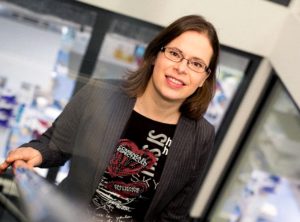
FNR ATTRACT Fellow Prof Dr Ines Thiele works on creating a virtual representation of the human metabolism, together with her team and colleagues at the Luxembourg Centre for Systems Biomedicine (LCSB) at the University of Luxembourg. The aim is simple, yet wide: Understanding what role our gut and diet play in the development of diseases, but also how this knowledge can be leveraged to improve health and well-being.
“We use a systems biology approach to represent the metabolism occurring in the human body – on the computer, as accurately as possible, given the current knowledge available,” summarises Prof Dr Ines Thiele, who set up the Molecular Systems Physiology group at the LCSB in 2013.
Interdisciplinarity is key
Representing the human metabolism in a computer model requires a wide skill set – Thiele’s team alone is made up of computer scientists, bioinformaticians, microbiologists, as well as biochemists, and molecular biologists, with programming forming part of the daily tasks.
Having relocated from Iceland, Thiele points out that her reasons for coming to Luxembourg included the possibility to work with LCSB FNR ATTRACT Fellows Paul Wilmes and Karsten Hiller, as well as the chance to build up something new at the young LCSB and moving more towards the domain of biomedicine.
Diet, a key to better health?
“One of the questions I want to tackle is how we can use our diet to become or remain healthier”, Thiele explains, adding:
“In order to do that we would not only need the human metabolic network that we have been creating over the past decade, together with other scientists, but also representation of the microbes that live within us, particularly in the intestinal system. We have been working on since I arrived here in 2013.”
“This work was published in ‘Nature Biotechnology’ in 2017, which was a highlight: we now have more than 800 microbiome virtual models that permit us to integrate the avalanche of microbiome data that is coming out to further understand what those microbes are doing to the host and how they interact on the diet-gut health axis.”
Using metabolism to shed light on disease
The work undertaken by Thiele and her team also contributes to the National Centre for Excellence in Research on Parkinson’s Disease (NCER-PD), an 8-year programme launched by the FNR in 2015. For the Parkinson’s study, Thiele and her team’s task is to use the virtual representation of the human metabolism and combine it with metabolomics data on plasma to identify biomarkers for Parkinson’s disease.
By looking at which metabolites are present in the blood of healthy individuals versus that of someone with the disease, the aim is to find a diagnostic biomarker that would help identify people at risk of developing the disease early on and, ultimately, to slow down the disease.
“Understanding which markers there are, and which traits appear early on in the disease – before the symptoms start – is important in helping us to understand what therapeutic opportunities there are,” Thiele explains.
“These grants ultimately allow me to fulfil my vision I have for biomedicine”
The work led by Thiele has not only led to several publications in prestigious journals – in 2017, Thiele was awarded a sought-after 1.6. MEUR Starting Grant by the European Research Council (ERC), an outstanding accomplishment especially considering only 13% of the proposals submitted for this type of grant were selected for funding in 2017.
“The ERC grant is based on the work that has been enabled through my FNR ATTRACT grant,” Thiele says, explaining that the 5-year duration of the ATTRACT funding allowed her to focus a large part of her time on doing the actual science. Thiele adds: “These grants ultimately allow me to fulfil my vision I have for the biomedicine and how I would like to develop the virtual human model that we have, with the ultimate aim to bring it back to the people through translational medicine.”
This success story originates from the FNR 2017 Annual Report – view the Annual Report as PDF or interactive digital version
ATTRACT – Funding to attract outstanding researchers (between 2 and 8 years after their PhD) with high potential in strategic research areas in order to set up a research group in Luxembourg
FNR CALL: 2012
DOMAIN: BM – Life Sciences, Biology and Medicine
FNR COMMITTED: 1,500,000 EUR
PERIOD: 01.04.2013 – 31.03.2018
